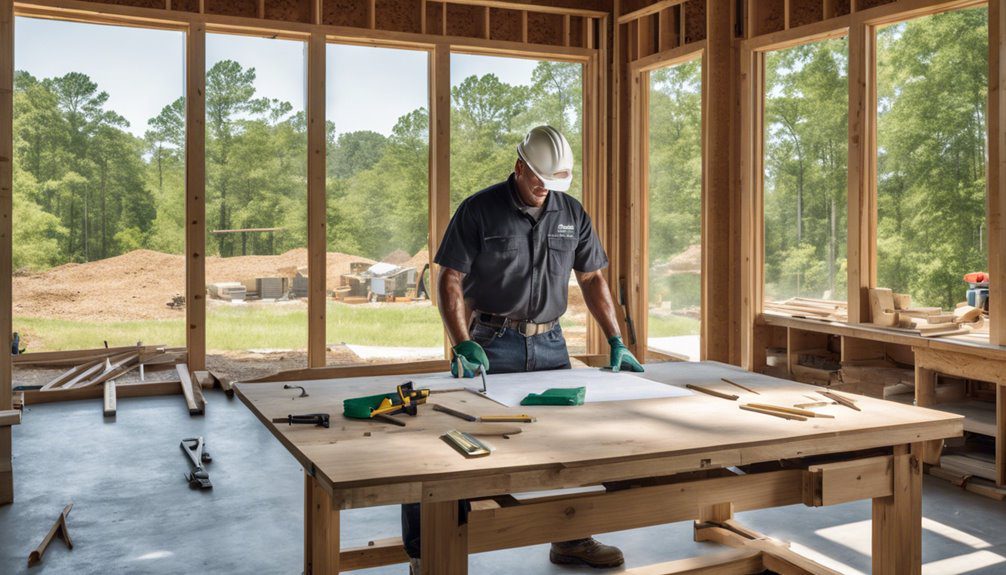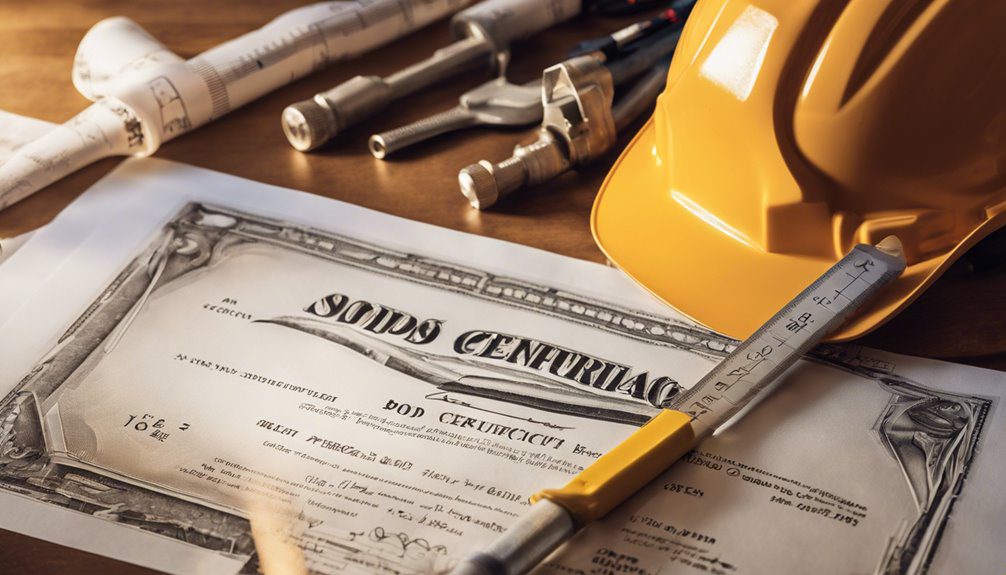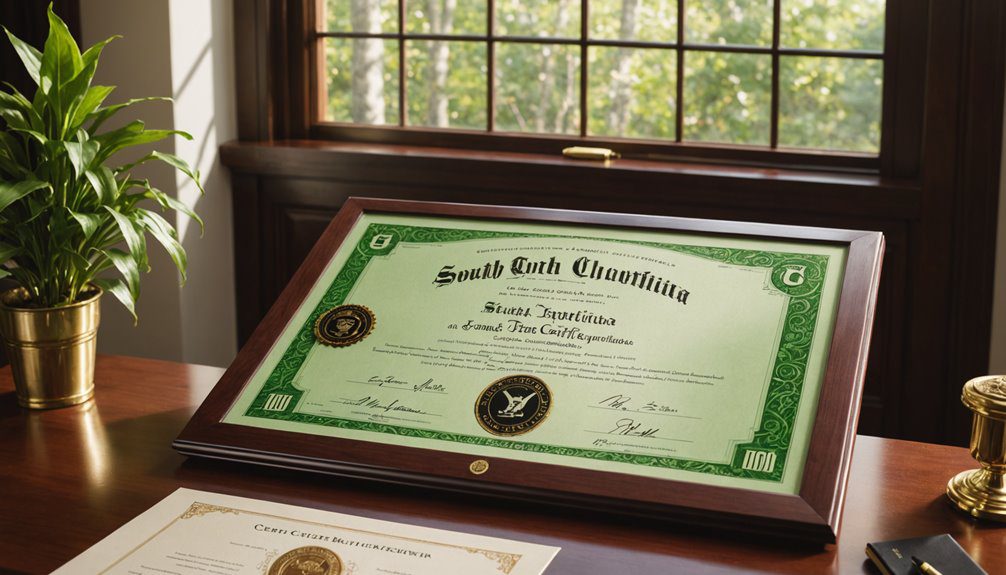If you're a builder in South Carolina, understanding the $15,000 Residential Builder Bond is essential for your business. This bond isn't just a regulatory formality; it acts as a safeguard for both you and your clients, ensuring that everyone adheres to state standards. You might be wondering who exactly needs this bond and what the application process looks like. As we explore these aspects, you'll see how this requirement could impact your operations and reputation in the market, and it might even surprise you to learn about the benefits that come with compliance.
Understanding the Bond Requirement

Understanding the bond requirement is crucial for any residential builder in South Carolina. You need to grasp why obtaining a $15,000 residential builder bond is essential for your business. This bond serves as a financial guarantee that you'll comply with state regulations and fulfill your contractual obligations. It protects your clients from potential losses due to your failure to meet construction standards or complete the project as agreed.
When you apply for a bond, you're essentially providing assurance that you'll operate ethically and responsibly. It's not just a formality; it's a reflection of your commitment to quality work and customer satisfaction.
Failure to secure this bond can limit your ability to obtain necessary licenses or permits, hindering your ability to work in the state.
Moreover, understanding the bond requirement helps you prepare for the application process, which often involves a review of your financial history and business practices. Being proactive in addressing these factors can make securing your bond smoother and more efficient.
Ultimately, meeting the bond requirement demonstrates professionalism and builds trust with potential clients, setting the foundation for a successful building career in South Carolina. Additionally, it is important to note that similar to Louisiana Surety Bonds, the residential builder bond ensures compliance with state regulations and provides financial assurance for contractors.
Purpose of the Residential Builder Bond
The purpose of the residential builder bond is to protect both builders and clients in South Carolina's construction landscape. This bond acts as a safety net, ensuring that builders adhere to state regulations and uphold their contractual obligations. If you're a builder, it demonstrates your commitment to quality and professionalism, helping you build trust with your clients.
For clients, the bond serves as a financial guarantee. If you encounter issues like unfinished work, poor craftsmanship, or violations of building codes, you have a recourse to claim against the bond. This means you won't be left high and dry if a builder fails to deliver on promises.
Additionally, having a residential builder bond can enhance your reputation in the industry. Clients often prefer working with bonded builders because it reflects reliability and accountability. It also helps you stand out in a competitive market, securing more job opportunities.
Ultimately, the bond fosters a sense of security for everyone involved, promoting smoother transactions and reducing the risk of disputes. By investing in a residential builder bond, you're not just protecting yourself; you're also contributing to a more trustworthy construction environment in South Carolina. Furthermore, surety bonds serve as financial security for project completion, offering peace of mind to all parties involved.
Who Needs a Builder Bond?

Builders and contractors operating in South Carolina need a builder bond to legally engage in residential construction projects. This bond serves as a financial guarantee that you'll adhere to state regulations and complete your work as promised.
If you're planning to build, remodel, or repair residential properties, obtaining this bond is essential for your business.
Specifically, if you're a general contractor, subcontractor, or a tradesperson, you must secure a builder bond to ensure compliance with local laws. Homeowners often look for licensed and bonded professionals before hiring, as it provides them peace of mind that you're accountable for your work.
If you're working on projects that exceed a certain value, or if you're applying for specific licenses, you'll likely be required to obtain a builder bond.
Even if it's not mandated, having one can enhance your credibility and help you stand out in a competitive market. Additionally, obtaining a builder bond can provide financial security to clients, ensuring that funds are available if obligations are unmet.
Application Process for the Bond
Obtaining a builder bond in South Carolina involves a straightforward application process. First, you'll need to gather essential documents, such as your business license and proof of experience in the construction industry. This information helps the surety company evaluate your qualifications.
Next, you'll fill out the bond application. This form typically asks for details about your business, including your legal structure, years in operation, and any relevant financial information. Be honest and thorough; inaccuracies could delay your application or lead to denial.
After submitting your application, the surety company will review it and assess your creditworthiness. They may request additional documents or information during this phase. If everything checks out, you'll receive a quote for the bond premium. The approval time typically ranges from a few days to weeks, depending on the surety company's processes.
Once you agree to the terms, you'll pay the premium and receive your bond. Keep a copy for your records, as you'll need to present it to the South Carolina Residential Builders Commission.
Costs Associated With Obtaining the Bond

Understanding the costs associated with acquiring a builder bond in South Carolina is crucial for your financial planning. The primary cost you'll face is the premium, which typically ranges from 1% to 3% of the bond amount. For a $15,000 bond, this means you might pay anywhere from $150 to $450 annually.
Your credit score plays a significant role in determining your premium; better credit usually leads to lower rates.
In addition to the premium, some surety companies may charge an application fee, which can vary. You might also encounter additional costs for document preparation or processing.
It's essential to review the terms and conditions closely, as some providers might include hidden fees that could affect the overall cost.
Don't forget to budget for potential renewals. Most bonds must be renewed annually, so consider how these costs will impact your finances over time. Additionally, understanding Ohio Surety Bond Requirements can help you anticipate similar costs in different states.
Benefits for Homeowners and Builders
Having a residential builder bond in South Carolina brings significant advantages for both homeowners and builders. For homeowners, this bond offers peace of mind. It ensures that the builder will adhere to state regulations and industry standards. If any issues arise during the construction process, the bond acts as a financial safety net, allowing homeowners to seek compensation for damages or incomplete work.
For builders, having a bond enhances credibility and trustworthiness. It demonstrates professionalism and commitment to quality, making it easier to attract clients. When homeowners see that you're bonded, they're more likely to choose you over competitors who aren't. This bonding can also streamline the licensing process, as many jurisdictions require it for compliance.
Moreover, a residential builder bond can help foster better relationships between you and your clients. When homeowners know you've taken the necessary steps to protect their investment, they'll feel more confident in your abilities. Additionally, this bond serves as a vital component of risk management in the construction sector, safeguarding both parties against potential disputes.
Ultimately, this bond not only safeguards homeowners but also positions builders as reliable professionals in a competitive market. Embracing the bond can lead to more successful projects and satisfied clients for everyone involved.
Common Issues and Resolutions

Common issues can arise during the construction process, even with a residential builder bond in place. One common problem is delays in project completion. You might encounter unforeseen circumstances like bad weather or supply shortages.
To resolve this, maintain open communication with your builder and establish a revised timeline.
Another issue could be disputes over work quality. If you're unhappy with the craftsmanship, address it promptly. Document your concerns and communicate them to the builder.
Most reputable builders will be willing to make necessary corrections.
Payment disputes can also occur, especially if you feel the work isn't meeting your expectations. To prevent misunderstandings, ensure that all payment schedules and expectations are clearly outlined in the contract.
If disputes arise, mediation can often help both parties reach a satisfactory resolution.
Lastly, insufficient permits can lead to legal complications. Always verify that your builder has the necessary permits before starting work.
If issues arise, consult with local authorities for guidance on how to proceed.
Maintaining Compliance With Bond Regulations
To ensure a smooth construction process, it's vital to maintain compliance with bond regulations. Start by familiarizing yourself with the specific requirements of your $15,000 bond in South Carolina. This includes understanding the conditions under which the bond can be claimed and the obligations you must fulfill to keep it active.
Next, keep meticulous records of all your projects, contracts, and communications with clients. This documentation not only helps in managing your responsibilities but also serves as proof of compliance if any disputes arise.
Regularly review your insurance policies to ensure they align with bond requirements and cover any potential liabilities. You should also stay updated on local regulations and changes in the law that may affect your bonding requirements.
Attend industry workshops or join professional associations to network and gather insights into best practices. Lastly, if you encounter issues, address them promptly to avoid complications.
Open communication with your surety company can help resolve any concerns before they escalate. By staying proactive and organized, you'll maintain compliance with bond regulations and foster trust with your clients. Additionally, understanding the role of surety bonds in protecting stakeholders can further enhance your business practices.
Conclusion
In summary, obtaining the South Carolina Residential Builder Bond is essential for your success as a builder or contractor. Not only does it protect your clients and ensure compliance with state regulations, but it also boosts your credibility in the industry. By understanding the requirements and process, you can secure this bond and enhance your reputation. Remember, maintaining compliance is key to avoiding common issues and ensuring a smooth construction experience for everyone involved.


